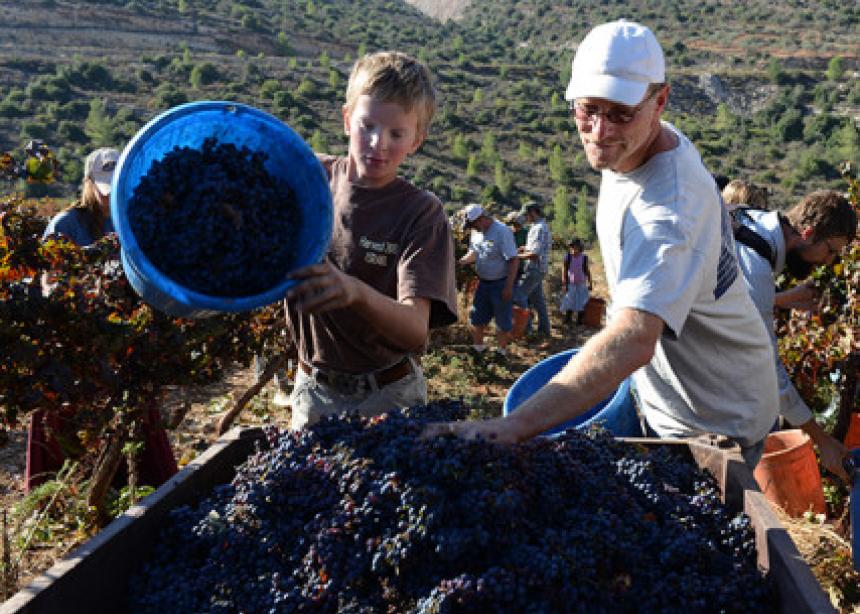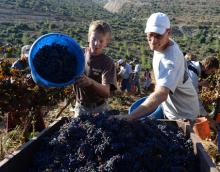Sitting in the shadow of a row of leafy grapevines, 26-year-old Zac Waller grabbed his guitar and started playing a hymn.
The soulful sounds tripped down the hillside adjacent to the Jewish settlement of Dolev, west of Jerusalem, bringing a smile to the volunteers harvesting grapes in the warm October sun.
Waller is among a group of Christians who are increasingly coming to the West Bank to help Israelis and Palestinians with the grape and olive harvests. The Christians see it as a religious duty.
During a trip to the Holy Land several years ago, Waller’s father, Tommy Waller, was deeply moved when Nir Levy, a winemaker from the settlement of Har Bracha, pulled out his Bible and read from the Book of Jeremiah, “Again you will plant vineyards on the hills of Samaria.”
“That verse spoke to me from a spiritual place,” the elder Waller says. “Before that, God was ethereal. I had never been physically touched by faith before.”
Tommy Waller is the founder of HaYovel, which brings together more than 300 volunteers from 14 countries to work in the summer and winter in vineyards owned by Jewish residents, or settlers, of the West Bank.
The West Bank — the land on the western shore of the River Jordan, where Jesus was baptized — is where much of biblical history took place. Residents refer to it by the biblical names Judea and Samaria.
Evangelical Christians don’t just farm beyond the Green Line, Israel’s internationally recognized border, but donate significant sums to support Israeli schools, hospitals, Holocaust survivors and immigrant absorption.
On the other side of the political divide, Christians are increasingly donating money to Palestinian causes and institutions. They’re also volunteering to help Palestinian farmers, especially during the busy autumn olive-picking season.
Like HaYovel’s volunteers, those who take part in pro-Palestinian solidarity missions pay their own way, often through fundraising appeals in their local communities. Antwan Saca, deputy director of Holy Land Trust, a Bethlehem-based organization that organizes olive-harvesting opportunities for tourists and pilgrims, said his program encourages visitors to interact with Palestinian villagers.
On the spiritual level, “it enables Christians to fulfill the dictate to stand up for the weak and the oppressed, and to deliver justice through faith,” Saca said.
The West Bank is disputed land and will remain so until Israelis and Palestinians work out their territorial differences. Controlled by the Ottoman Empire for decades, the land is home to hundreds of thousands of Israelis living among about 2 million Palestinians.
Advocates for Palestinian farmers are pleased to have the volunteer harvesters, who they say help create an additional line of defense against settler extremists accused of damaging thousands of Palestinian olive trees. There also have been instances of Palestinian vandalism, but on a much smaller scale.
Bill Christensen, associate pastor of Vineyard Church of Columbus, Ohio, said he and more than a dozen young members of his evangelical Christian church recently wrapped up seven days of olive-picking in West Bank villages.
“We’re serving the Palestinian people. Service is part and parcel of expressing one’s faith and walking with Jesus,” Christensen said at a meal in Bethlehem.
In the Israeli settlement of Dolev, volunteers are equally passionate about their work.
Wiping sweat from her brow during a break from picking grapes, Lois Llewellyn, a 52-year-old caregiver from Riverside, Calif., said she felt “part of the prophecy” of Jewish renewal in the Land of Israel.
“Here the stones of the Bible come alive. I’m in the land where Jesus walked, and the prophecy is being fulfilled.”
A former organic produce grower from the hills of Tennessee, Tommy Waller came to the West Bank with his 11 children and his wife. Despite his faith in Jesus, Waller emphasized that participants are not in the Holy Land to proselytize.
“We’re not missionaries. We’re not trying to convert anyone. We stay among ourselves,” he said.
Waller finds it hard to fathom why the international community denies Jews the right to live on “contested land,” whose status has so far resisted resolution despite numerous Palestinian-Israeli negotiations. He thinks there is room for both peoples in the West Bank.
He said most organizations and aid groups in the West Bank support Palestinian agriculture and do not help Jewish farmers. “We have to be fair.”
Christensen, 61, said his church is helping the Palestinians harvest to express their faith and raise awareness of the Palestinian situation. Jesus, he said, came not to be served but to serve.
As for helping Jewish farmers, too, he said, “We wouldn’t be opposed to it, but (it) didn’t occur to us that they needed help.”
Saca said his aim of helping Palestinian farmers is to allow Christians to help “the oppressed. We don’t have a political agenda.”
Gazing at the small Israeli vineyard that snaked its way down a rocky hillside, Tommy Waller said HaYovel seeks only to bless the Jewish people in their biblical homeland, “to heal the relationship between Christians and Jews, who Christians have hurt throughout history,” he said.
--Posted Dec. 5, 2013



Add new comment
Canadian Mennonite invites comments and encourages constructive discussion about our content. Actual full names (first and last) are required. Comments are moderated and may be edited. They will not appear online until approved and will be posted during business hours. Some comments may be reproduced in print.